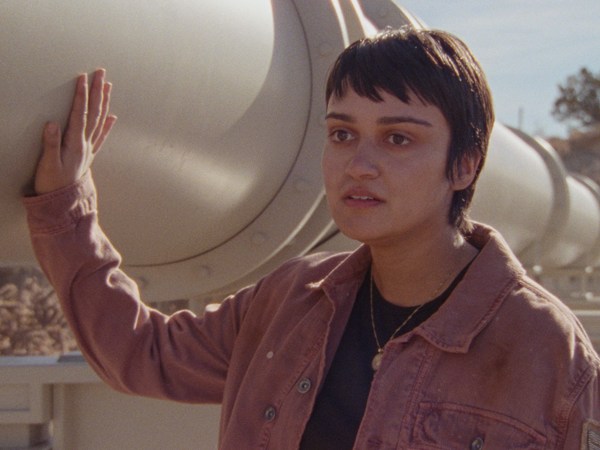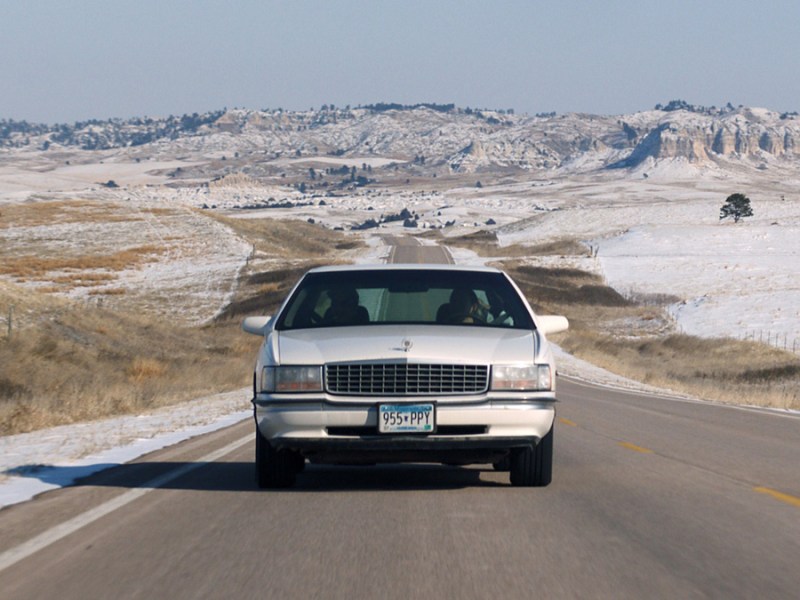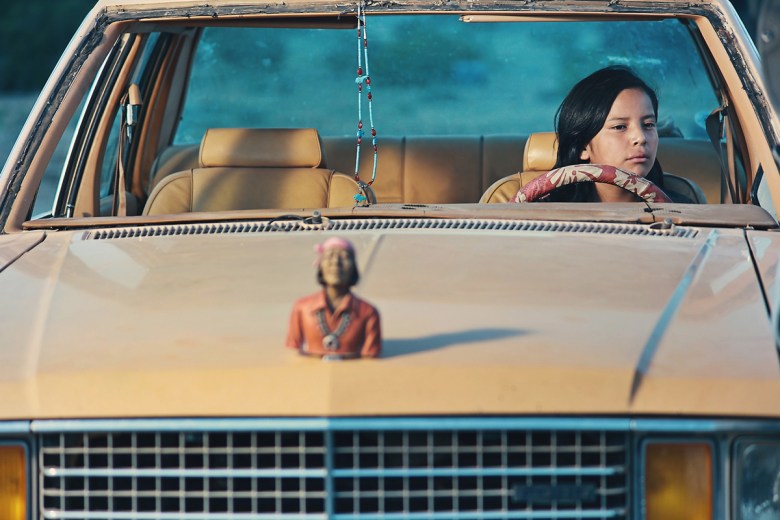
Frybread Face and Me, the new film by writer/director Billy Luther (Navajo/Hopi/Laguna), is a refreshing Indigenous queer take on the coming-of-age genre, shot in New Mexico with some of today’s hottest emerging and established Diné actors. A crowd-pleasing, family-friendly tale set on the Navajo Nation in 1990, it’s replete with pop-culture references from the big city of San Diego, including Fleetwood Mac, SeaWorld and Shamu, juxtaposed with reservation staples — bent cutlery, a crash course in fence-building and hard lessons from an angry uncle and a skeptical cousin, not to mention a Diné grandma who communicates only in the Diné language. Benny (Keir Tallman), our hero, is a fish out of water in this Indigenous story, someone who is going to have to learn to swim, and swim quickly.
Luther is no stranger to making films inspired by Diné culture; his 2007 documentary Miss Navajo explored how Diné people choose their Miss Navajo Nation. In Frybread Face and Me, he has crafted a film that explores complex and contemporary Indigenous thematic structures and tropes. What happens to Indigenous people who choose to leave the reservation, or to those who stay, for that matter? Is happiness possible in either situation? And what does that happiness look like? Why is an uncle so angry on the rez? How does an aunt decide to return to the big city? These are but a few of the subjects touched on in the film.
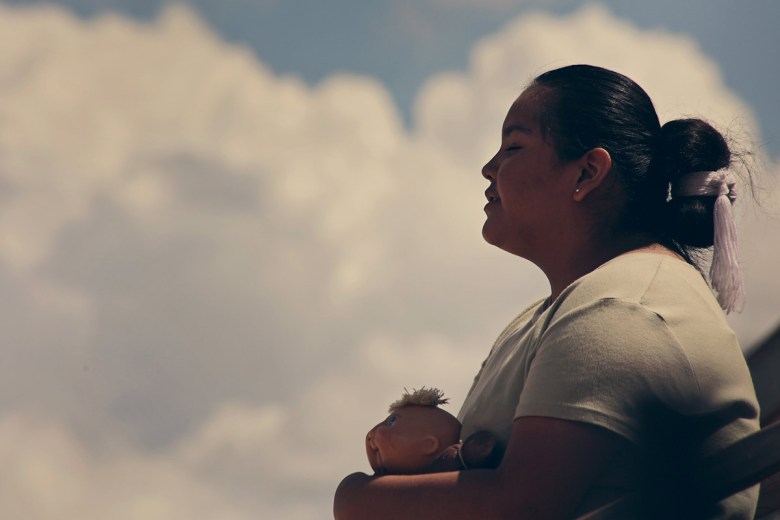
Frybread opens with the kind of home video footage that lets the viewer know that this is likely to be a deeply personal story. Then it cuts to a diner, where Benny (Tallman) is not asked but told that he has to spend the summer with his grandma on the Navajo Nation. This drastically changes Benny’s exciting summer plans, including his chance to see Fleetwood Mac in concert. A knowing look from his mother, Ann (Morningstar Angeline), tells Benny all he needs to know: There is no getting out of this.
Luther has a smooth and steady hand in terms of story, tone and delivery, and the largely Diné cast he employs portrays his Diné characters with great success. From the opening diner scene with Nataani Nez Means (Oglala Lakota/Omaha/Navajo) as Benny’s father, who sits opposite Keir Tallman (Diné) and Morningstar Angeline (Diné/Chippewa/Blackfeet/Shoshone/Latina) as Benny’s mom, these actors know the nuances of what it means to be Diné, and what that kind of conversation in an American diner looks and sounds like. How often does an Indigenous director get to use actors portraying characters from the tribes they actually belong to? It must feel like working with an acting troupe you’ve known for a while. The cast has a natural chemistry; their dialogue and reactions feel authentic. The casting director, Angelique Midthunder, deserves recognition for helping to find the right actors for these roles.
And what a collection of actors they are; you will certainly recognize them if you follow any contemporary Indigenous media. When Uncle Roger (Jeremiah Bitsui) and Aunt Sharon (Nasheen Sleuth) visit the rez, it’s a veritable who’s who of the hottest contemporary Indigenous talent. Bitsui (Diné) of Breaking Bad fame and Diné TikTok celeb Sleuth are joined by Diné actress Kahara Hodges from Rutherford Falls as the wild and untamed Aunt Lucy. Benny’s angry Uncle Marvin, frustrated after a rodeo injury put him in a wheelchair, is played by Martin Sensmeier (Tlingit/ Koyukon-Athabascan), who also played the Comanche warrior “Sam” in the TV show 1883.
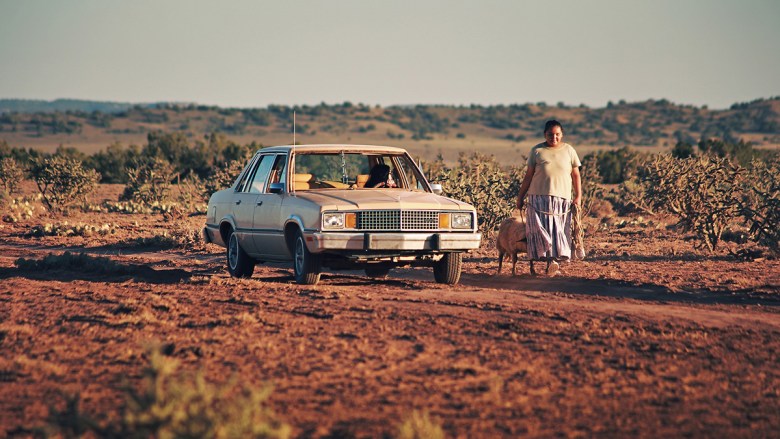
With the film being somewhat geared toward a family-friendly audience, some sort of pandering is to be expected, but fortunately there’s very little. One scene stands out as saying, “This is for the kids” — a dance scene using the beat-heavy contemporary music of Halluci Nation, in which the kids dance in the yard, holding Uncle Marvin’s boombox a la John Cusack in Say Anything as sheep look on curiously. Halluci Nation creates very likable and cinematic music, but the group’s music has become the “go to” music used to portray uplifting and inspirational Indigenous vibes, and the scene momentarily breaks the rhythm of the film. It would be nice to give them a rest and maybe feature another Indigenous band for a change. (Sorry, Halluci Nation.)
Billy Luther has crafted a thoroughly original Indigenous coming-of-age film that speaks to queerness but is centered on the complexity of growing up Indigenous. It tells the story of the various types of Indian Country upbringing, juxtaposing the influences in Indigeneity: urban life, rez life, aunts, uncles, cousins, grandmas, moms, dads, coming apart, coming back together — all the tangled threads and multiplicious nature of contemporary Indigenous life. Luther shows us a world where Fleetwood Mac and frybread coexist and make sense, and where the goal comes down to finding out how to make these things work for yourself.
Jason Asenap is a Comanche and Muscogee writer and director based in Albuquerque, New Mexico. We welcome reader letters. Email High Country News at editor@hcn.org or submit a letter to the editor. See our letters to the editor policy.

